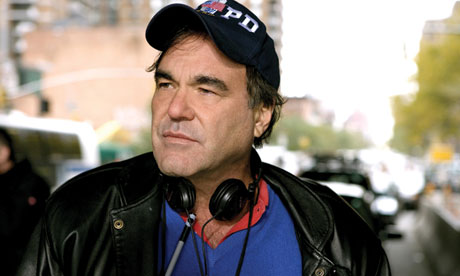http://www.goodreads.com/author/quotes/419249.Henry_A_Wallace
Dear C,
Have you seen Oliver Stone's "Untold History of The United States?" (... brought to my attention by friend Chuck Holton.)
I was especially taken by Stone's interpretation of the ouster of FDR vice-president, Henry Wallace. At the last minute, Democratic Party "leadership" replaced Wallace with Harry Truman.
In Stone's view, Wallace was a committed progressive who shunned "The Red Scare" and therefore who would have fashioned a categorically different post-war era.
The actual process by which Wallace was bumped from the ticket is jam-packed with jaw-dropping maneuvres - all of them bogglingly manipulative.
Here is Wallace's Wikipedia page. http://en.wikipedia.org/wiki/Henry_A._Wallace
Also, check out The Guardian article, "Oliver Stone: 'America always wins.' Oliver Stone got so sick of always reading the sanitised version of US history that he decided to write his own. He talks about the real reason America dropped the atom bomb, how Kennedy is a hero and why he can't stand Hillary Clinton" http://www.guardian.co.uk/film/2013/apr/15/oliver-stone-america-went-wrong
Excerpt: "Stone's... intriguing task is to do counterfactual history. Their American history isn't untold, but rather a meditation on what could have – and, in their view, should – have, happened. What if, they wonder, Truman had not succeeded Franklin D Roosevelt as president in April 1945? What if, instead of choosing Truman – whom the pair psychopathologise as having unresolved "gender issues" and portray as weak, biddable and blustering ("To err is Truman," 1940s Republicans sneered) – as Roosevelt's vice-presidential candidate in the 1944 presidential election, the Democratic convention had once more chosen the now little-known Henry Wallace to be FDR's running mate?
Their contention is that if, after FDR died in April 1945, vice-president Wallace had succeeded, postwar world history would have been very different. "The bomb would not have been dropped with Wallace or Roosevelt as president, in my opinion," says Stone. "Not at all. Not a chance. They [the military] would have opposed Wallace, given him a hard time, but you can't force a president to drop a bomb. You just can't."
Given that Stone and Kuznick's revisionist American history starts from the idea that Truman lowered the US's moral threshold and many of his successors continued that descent, this is no small issue. The drama of that 1944 Democratic convention is one that Stone and Kuznick wrote as a Hitchcockian thriller in the late 1990s before deciding to make it, a decade later, the linchpin of their documentary. "Bush wasn't an aberration," says Stone of the two-term Republican president whom he savaged in his 2008 biopic W, "Bush is the climax to an American mindset that had started with Truman and accelerated after world war two."
He portrays Wallace as the man who could have spared the US its postwar debacles – the cold war, Vietnam, the "war on terror" – had he managed to get that vice-presidential nomination in 1944. Wallace was, in short, the good father snatched away when America needed him most."
 Stone won military awards for his time as a soldier in Vietnam. He thinks Kennedy would not have committed US troops in south-east Asia. Photograph: Alfred Batungbacal/Time Life Pictures/Getty Images
Stone won military awards for his time as a soldier in Vietnam. He thinks Kennedy would not have committed US troops in south-east Asia. Photograph: Alfred Batungbacal/Time Life Pictures/Getty Images
Pax
Alan
Oliver Stone defends Edward Snowden over NSA revelations
The outspoken film-maker hails the whistlebower as a 'hero' at Czech film festival and claims that 'the United States has repeatedly violated the fourth amendment'
guardian.co.uk,

The film-maker has voiced his support for Edward Snowden. Photograph: Francois Duhamel
Oliver Stone, never one to run scared from a controversy, yesterday waded into the ongoing NSA debate, defending the American whistlebower Edward Snowden and hailing him as a "hero" for exposing the US's mass surveillance programme.
"It's a disgrace that Obama is more concerned with hunting down Snowden than reforming these George Bush-style eavesdropping techniques," the Oscar-winning director told audiences at the Karlovy Vary international film festival in the Czech Republic.
Snowden, 30, is living in a transit zone in a Moscow airport where he is seeking asylum from federal prosecution in the US. He is believed to have applied for asylum in 20 countries - thus far without result. In the meantime, his revelations have sparked a diplomatic crisis. In the past few days both the German and French leaders have described the NSA's surveillance program as "unacceptable".
"To me Snowden is a hero because he revealed secrets that we should all know, that the United States has repeatedly violated the fourth amendment," Stone said. "He should be welcomed and offered asylum. But he has no place to hide because every country is intimidated by the United States."
Stone, 66, was at the festival to unveil episodes of his new Showtime TV series, Oliver Stone's Untold History of the United States, as well as the extended "ultimate" cut of his unloved 2004 epic Alexander.
The film-maker's vocal support for Snowden is entirely in character. In recent months Stone has also thrown his weight behind WikiLeaks founder Julian Assange, visiting the activist at his base at the Ecuadorian embassy in London and criticising the depiction of Assange in two upcoming Hollywood pictures. "Julian Assange did much for free speech," Stone has said. "And he is now being victimised by the abusers of the concept."

No comments:
Post a Comment